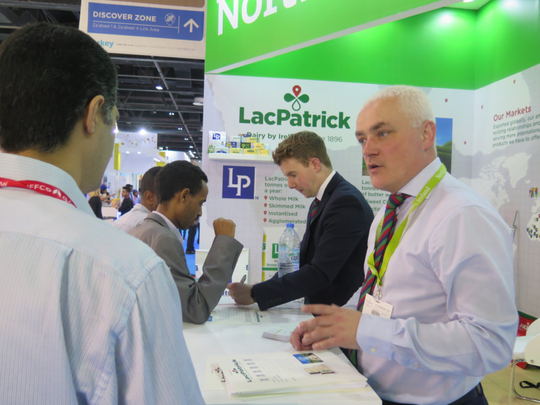
Dubai
With the Brexit deadline of March 2019 a little over a year away, dairy farmers on the border between Northern Ireland and the Republic of Ireland, the only place where the UK will continue to meet the EU, are anxiously preparing for the worst.
“I was out recently on a farm [that straddles Northern Ireland and the south], and there’s a stream where the farmer takes the cattle over across the border, so he’s on both sides. That’ll now be an EU border,” Michael Collins, deputy chief executive of LacPatrick Dairies, told Gulf News on Wednesday at Gulfood.
LacPatrick Dairies is a dairy cooperative and processor, located on the border between Northern Ireland and the Republic of Ireland, made up of 1,100 farmers supplying 600 million litres of milk a year.
The question of the 300-mile border that has separated the two countries since 1921 is seen as one of the most contentious issues in the Brexit negotiations between the UK and the EU. Currently, the two halves of the island of Ireland trade freely, with 25 per cent of all goods exported from the north going south to the Republic of Ireland.
However, if the UK and the EU do not have in place a deal for the border when Britain leaves the union on March 29, 2019, a customs border will be put in place between the north and the south.
LacPatrick Dairies says its milk trucks make 10,000 border crossings each year, with milk produced on farms in the Republic of Ireland, and then processed in Northern Ireland before being exported.
A hard border and trade tariffs, therefore, is a huge worry for the group. “Today, we don’t recognise the border,” Collins said, pointing to how freely and porously the two countries trade and interact. “The worst case scenario for us is that there is a build-up of tankers at the border, trying to cross over,” he said, adding: “Milk is a fresh produce that must be processed within a matter of hours or days.”
Today, much of the milk produced in the north is transported to the south, in order to be processed. This could be subject to tariffs and hold-ups in the case of a so-called ‘hard border,’ or a border that is strongly controlled by customs officials.
Of course, Collins said, he was hoping for a deal that allowed seamless border crossings.
As for the south, the greatest concern is their “dependence on the UK market, particularly for the cheese, and cheddar cheese,” the dairy executive said.
He added: “It’s a fairly uniquely British taste, so if you have your factory set up to produce that product, and all of a sudden you have tariffs of 50 per cent, clearly it’s going to make you uncompetitive.”
Asked if he was concerned over any potential loss of jobs as a result of the split, Collins said that he foresaw a potential realignment of staff along the borders, but not net job losses.
Overall, he said, he was optimistic about the situation.
“Regardless of any trade issues that might arise, we will find a way of operating … Particularly in that part of Ireland, people have had to deal with borders, they’ve have had to deal with separation, for generations, so there’s always been a way of working,” Collins said.












